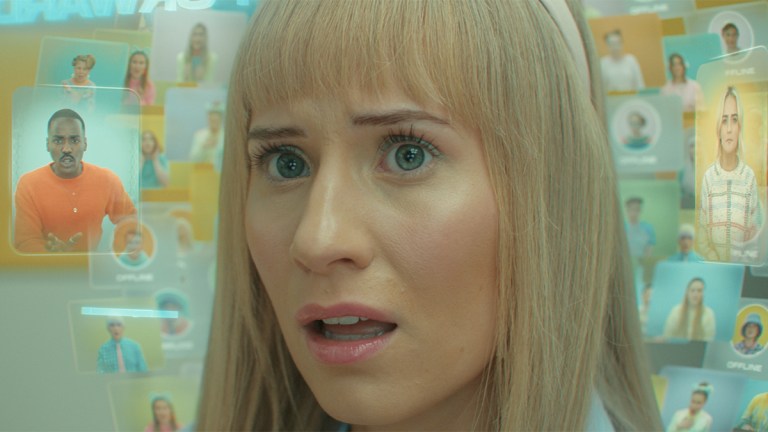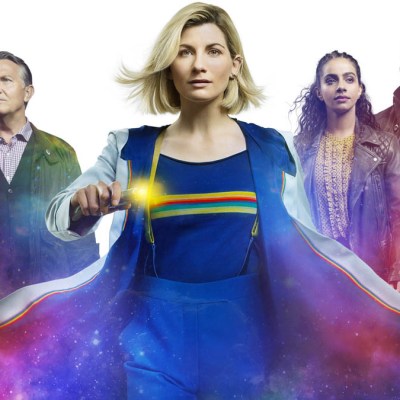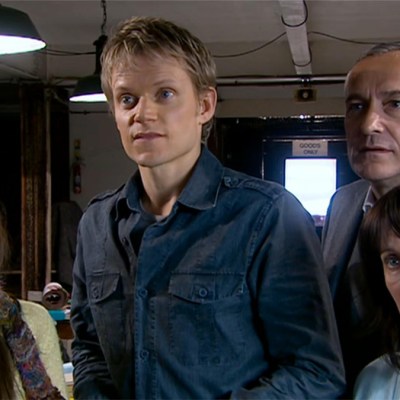Doctor Who Showrunner Predicted the “Dot and Bubble” Ending Would Be “Wildly Misinterpreted”
“It’s absolutely the opposite,” says Russell T Davies.

Warning: contains spoilers for Doctor Who episode “Dot and Bubble”.
Alongside the Sutekh reveal, the “Rogue” dance, and Ruby’s 73-yards-away mystery woman, any montage of Doctor Who series 14’s most memorable moments would have to include the “Dot and Bubble” ending. The episode five twist made an impact. It transformed “Dot and Bubble” from a comedic satire on the dangers of social media absorption, into a statement on the self-harming ignorance of white supremacy.
Written by Russell T Davies and directed by Dylan Holmes Williams (“73 Yards”), the story was set in Finetime, an off-world colony peopled exclusively by the young, beautiful, and – as made obvious in the final scenes – white. Enormous slug creatures were picking off the airhead population, and though the Doctor wasn’t able to break through the colony’s firewall to help on the ground, he and Ruby coached influencer Lindy Pepper Bean (Callie Cooke) on how to escape the beasties from afar.
Then, when the TARDIS was finally able to land underneath the city and the Doctor offered to transport Lindy and her vapid pals somewhere safe, they sneeringly turned him down. To them, travelling with a Black man was out of the question.
The Doctor understood their bigotry and pleaded with them to help all the same, but no. This lot would rather take their chances in the wilds of a hostile planet than accept help from somebody Black who could guarantee their safety. Ruby cried, the Doctor screamed in frustration, and Ncuti Gatwa revealed yet another frequency band on his huge spectrum of acting talent.
The reception was mixed. Some praised the twist for effectively challenging viewer complacency and starting a conversation about race with younger viewers; others felt it crassly turned a serious subject into a ‘gotcha’ moment; others questioned the kindness of giving this brand new Black Doctor an adventure with racists so soon into his travels.
Speaking in a behind-the-scenes feature in the most recent issue of Doctor Who Magazine (out now – subscriptions here), Davies defended the ending’s ugliness, citing the variety of the series, which had included a happy ending and song-and-dance number in previous weeks. He denied the twist was provocative, and instead called it “true”. “I don’t feel the need to be provocative; I find it more urgent because racism and homophobia are on the rise.”
Davies predicted to DWM that one part of the ending would be misread by viewers: the Doctor’s continued insistence on helping the Finetime colonists despite their racism.
“The most contentious issue, predicts Russell, will “not be that Finetime’s citizens are racists, but that the Doctor still offers to help them. That moment where he does not care what they think will be wildly misinterpreted as conceding to their opinions and humbling himself to them. It’s absolutely the opposite.
He is so much better than them. So much braver. So much cleverer. Sometimes you help an ant on the floor, you move a rock out of its way, you even talk to it out loud… That’s what they are to him. Ants. He’s moving a rock. It’s not even a rock, it’s a pebble, because his might is so great.”
The Doctor’s god-like perspective in relation to Lindy and co. wasn’t misinterpreted here, but Davies was right to think that the Doctor’s frustrated benevolence would form part of the wider conversation.
Happily – for vindictive mere mortals, if not for the Doctor – Davies also confirmed the fates of the Finetime racists. “Believe you and me, I know what that planet is like out there. They’re dead.” Racist morons: 0, Alien Wilderness: 1.
Doctor Who series 14 is available to stream now on BBC iPlayer in the UK and on Disney+ around the world.



